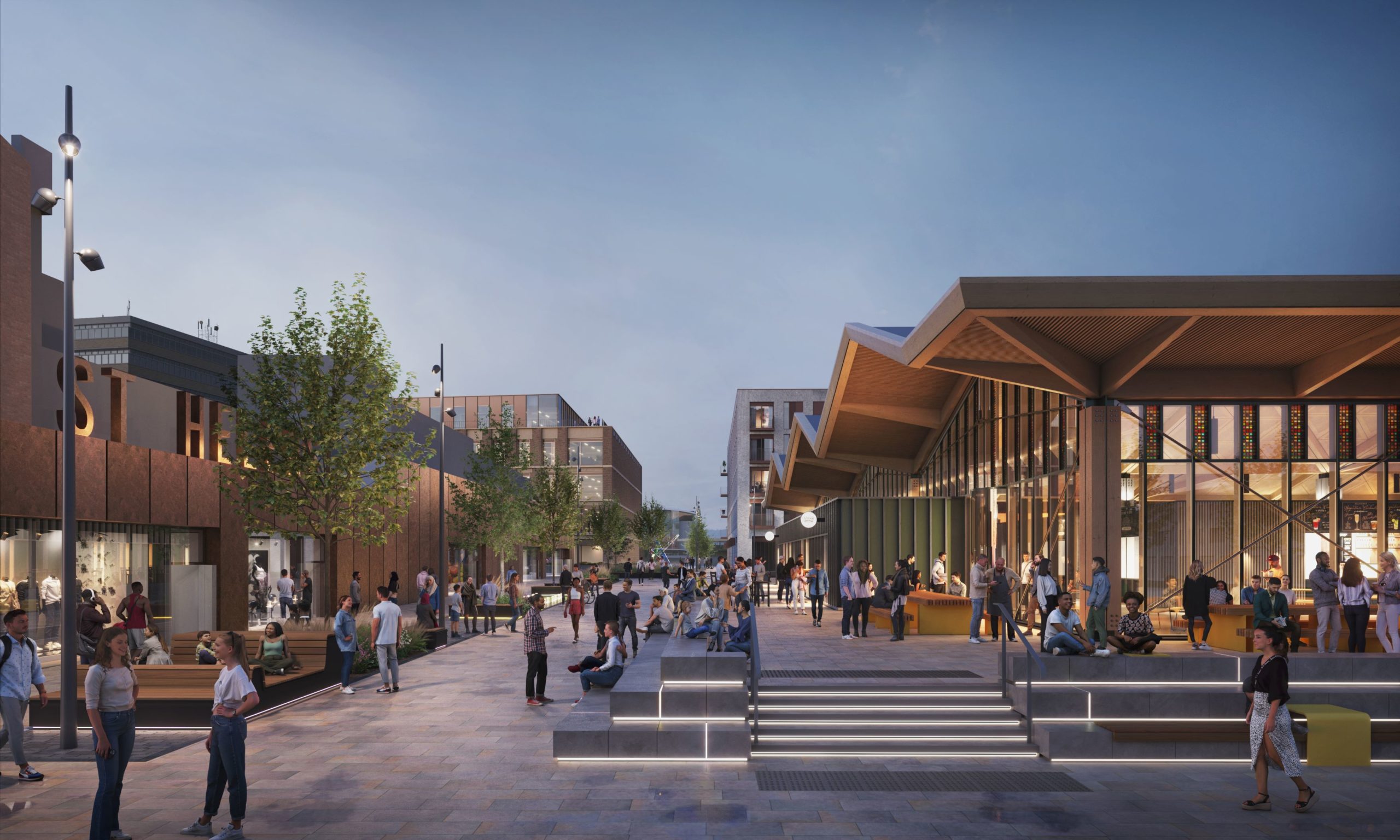Planning application submitted for St Helens town centre
06.12.23 6 min read

We’ve submitted a planning application for the first phase of a more vibrant, sustainable and people-friendly town centre for St Helens.
The planning application covers a new Market Hall flanked by a mixed-use area set around a 120-bedroom globally branded hotel, 64 stunning new homes, a 75,000 sq ft office and 11,000 sq ft of modern retail space, along with extensive high quality public spaces.
A separate planning application in the next few weeks will cover the other main element of phase one – the replacement of an existing and outdated bus station with a new modern multi-modal transport interchange. It will be part-funded by the Liverpool City Region Combined Authority as part of a major upgrade of sustainable travel facilities.
By re-imagining the space where the enclosed Hardshaw Centre currently stands, the project will create new public spaces, better walking routes, and invite nature to flourish in high quality landscaped areas. Enhanced by trees, plants and wildlife, the overall project masterplan will deliver a Biodiversity Net Gain for St Helens of over 1,000%, changing the look and feel of the town centre.
To underline the project’s impressive sustainability credentials, all the new homes in the scheme have been designed to reduce energy bills and will meet the energy use intensity performance of a Passivhaus building – a standard used to reduce energy consumption through use of highly efficient insulation, airtight building envelopes, and other measures.
As part of our ECF partnership with Legal & General and Homes England, we’re working with St Helens Borough Council.
Stuart Rogers, said: “Sustainability has driven every decision taken on this once-in-a-generation project and the design of new buildings reflects a belief we share that the future has to be shaped by reducing our impact on the environment. The Market Hall and new office, for example, will use exposed structural timber to create a modern, wooden environment, which significantly reduces the embodied carbon of the buildings.
Councillor David Baines, Leader of St Helens Borough Council, said: “We are ambitious for what can be achieved through this once in a lifetime regeneration scheme, and we should all be excited about what the future holds.
“We are determined to preserve and celebrate our local heritage in the detail and delivery of the project, but we are also looking to the future, with an attractive, thriving and sustainable town centre for families to enjoy. It’s not just about buildings and public spaces – it’s about the jobs it will create in the delivery phase and years to come, the children it will inspire, and the pride it will give all of us in our home.”
Mayor Steve Rotheram has set the Liverpool City Region an ambitious goal of achieving net zero by 2040, a decade ahead of the UK national target, and is acting as both a leader and facilitator, encouraging and supporting residents, communities, and businesses on the journey to a lower carbon way of living and working.
He said:
Aside from creating a new and sustainable town centre, with spaces to be enjoyed by children and families, the redevelopment will deliver significant social value in direct support of the council’s recently adopted Inclusive Growth Strategy. Phase 1 is expected to have a strong impact in terms of employment and Gross Value Added (GVA) – some 485 new jobs will be created across the development once it is fully occupied, generating £23.2 million GVA each year.
The project is backed by St Helens Borough Council in the form of a £69.2 million funding package confirmed for phase 1. Support has also been made available in in the form of £21.49 million in grants from the UK Government and equity investment by ECF. Specifically, there are two related UK Government Town Deal grants totalling £10.49 million. The phase one proposals have also been awarded £0.812 million from the One Public Estate Brownfield Land Release Fund to help deliver the residential element.
Subject to planning approval, work will start on site in 2024.